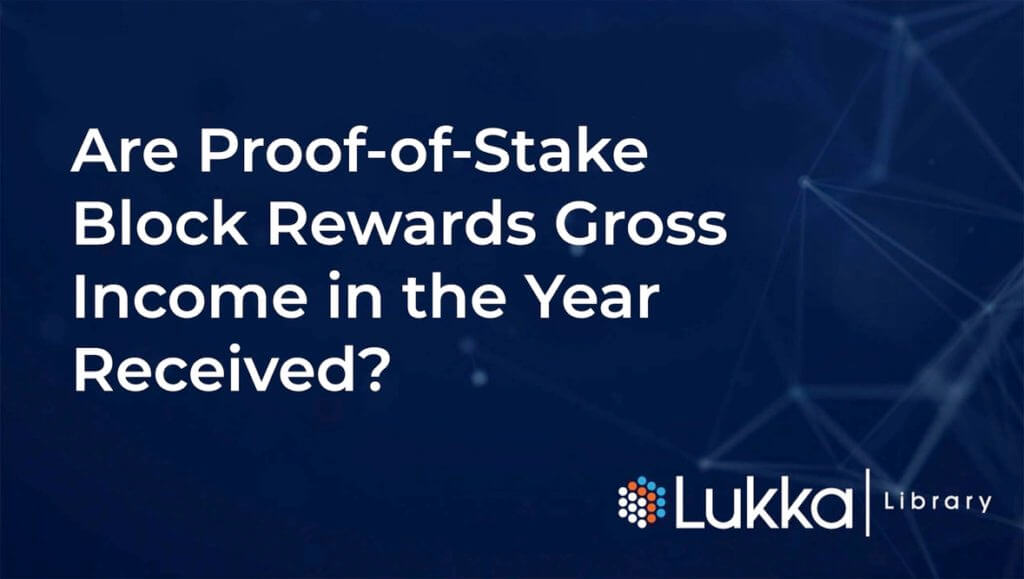Author: Abraham Sutherland, Adjunct Professor, University of Virginia School of Law
The discussion in this document reflects legal principles as of January 30, 2020.
Disclaimer: This paper does not provide legal or accounting advice.
Conservative answer: Yes.
Question 8 of IRS Notice 2014-21 (presented below) states the IRS’s position that proof-of-work mining rewards, such as Bitcoin, are gross income at the FMV of the reward tokens on the date received. Extending this guidance to the newer technology of proof of stake, proof-of-stake block rewards can also be included in gross income when received. This result is favorable to the Treasury, and in the short history of proof-of-stake cryptocurrencies this has emerged as the conservative approach in light of available guidance. Although the example in the IRS guidance is Bitcoin, which is not a proof-of-stake cryptocurrency, the Notice’s description of the taxpayer’s activity as “us[ing] computer resources to validate [cryptocurrency] transactions and maintain the public [cryptocurrency] transaction ledger” can also describe proof-of-stake validation activity. See also Section 61(a)(1); reg. section 1.61-2(d) (“compensation paid other than in cash”); and section 83 (“property transferred in connection with performance of services”).
Q-8: Does a taxpayer who “mines” virtual currency (for example, uses computer resources to validate Bitcoin transactions and maintain the public Bitcoin transaction ledger) realize gross income upon receipt of the virtual currency resulting from those activities?
A-8: Yes, when a taxpayer successfully “mines” virtual currency, the fair market value of the virtual currency as of the date of receipt is includible in gross income. See Publication 525, Taxable and Nontaxable Income, for more information on taxable income. (IRS Notice 2014-21, 2014-16 IRB 938.)
Alternative answer: No.
Including proof-of-stake block rewards in gross income at the time received can result in demonstrably inequitable taxation as well as notable compliance burdens. No statute or regulation clearly mandates this approach. The 2014 IRS guidance does not carry the force of law, and it does not provide legal analysis in support of its conclusion. Even if the guidance is persuasive with regard to Bitcoin and proof of work, it does not necessarily extend to proof-of-stake cryptocurrencies, which were in their infancy when the IRS released its guidance in early 2014.
An alternative approach, following the law and practice of the taxation of taxpayer-created property, would be to report income from reward tokens at the time of the reward tokens’ sale.
Analysis:
A proof-of-stake cryptocurrency allocates opportunities for validators to create blocks – and along with these blocks, new and valuable cryptocurrency tokens – on the basis of the validator’s “stake,” or share of ownership, in that cryptocurrency network. In contrast to Bitcoin users, a high percentage of taxpayers who hold certain proof-of-stake cryptocurrencies will receive newly created reward tokens. Proof-of-stake validation enables token holders to offset the effects of dilution caused by the creation of new tokens and, in many cases, to increase their stake in the network. But treating a reward token as income at the time received overstates the validator’s gain from that token, because each new token dilutes the stake in the network represented by every existing token. The overstatement of gain can be dramatic.
Consider a simple proof-of-stake cryptocurrency that increases its token supply by 5% over the course of the tax year. If every token holder participates in validation and ends the year with 5% more tokens, every token holder would hold the same stake in the network and no token holder would improve his financial position as a result of validation. Applying the 2014 guidance would result in significant gross income despite the lack of any actual gain caused by validation. Although comparisons to corporate stock and dividends can be misleading, this example can be compared to pro rata stock dividends under Section 305(a), or to new corporate shares issued in a stock split, neither of which is included in gross income.
More realistically, proof-of-stake block rewards may provide the taxpayer with an actual gain, because not all of the cryptocurrency’s token holders will share in the new tokens created as block rewards. However, the overstatement of gain may still be significant, undermining the rationale for treating block rewards as immediate gross income.
Tezos, a proof-of-stake cryptocurrency, provides an illustration. Simplifying the numbers only slightly, the Tezos reward tokens created during the year 2019 increased the total supply of Tezos tokens by about 5% over the course of the year. Some token holders did not receive any reward tokens in 2019, so those who did receive block rewards – Tezos validators – increased their number of tokens by about 7%. Applying the 2014 guidance, validators would be taxed based on this 7% increase in tokens, rather than validators’ actual gain of about 2%, overstating validators’ gains from validation by more than 300%.
Property that is created by the taxpayer is generally not taxed as income until it is sold. In a proof-of-stake cryptocurrency, validators create new blocks of transactions that are added to the blockchain, and at the same time create the new reward tokens that increase the total token supply. Treating block rewards as created property eliminates the overstatement of validators’ gains, as reward tokens and purchased tokens alike are taxed based on their value at the time of their sale. Reporting income from reward tokens at the time of their sale also simplifies tax compliance and reduces liquidity concerns. With Tezos, for example, validators take possession of newly created reward tokens once every three days. If such tokens are gross income at their FMV on the date received, this entails approximately 120 taxable events each year – or more than that, if reward tokens must be sold to obtain the dollars required to pay tax.
The IRS has not addressed the taxation of reward tokens since its 2014 guidance. In its January 26, 2020 “Report on the Taxation of Cryptocurrency,” the New York State Bar Association’s Tax Section noted the lack of clarity concerning the proper taxation of proof-of-stake block rewards and recommended that the IRS and Treasury Department study the issue further. (NYSBA Report No. 1433, Recommendation 24 and Section V.G, available at aboutblaw.com/OpL.)
Proof-of-work taxation is addressed in the Lukka Library Paper “Are ‘mined’ proof-of-work cryptocurrency tokens gross income in the year received?” (January 30, 2020).
For an in-depth treatment of block reward taxation, see:
Abraham Sutherland, Cryptocurrency Economics and the Taxation of Block Rewards, 165 Tax Notes 749 (Part 1; Nov. 4, 2019) and 165 Tax Notes 953 (Part 2; Nov. 11, 2019). The complete Tax Notes report is available at no charge at ssrn.com/abstract=3466796. An introduction to the problem of block reward taxation is available at CoinCenter.org/entry/taxing-cryptocurrency-block rewards.





